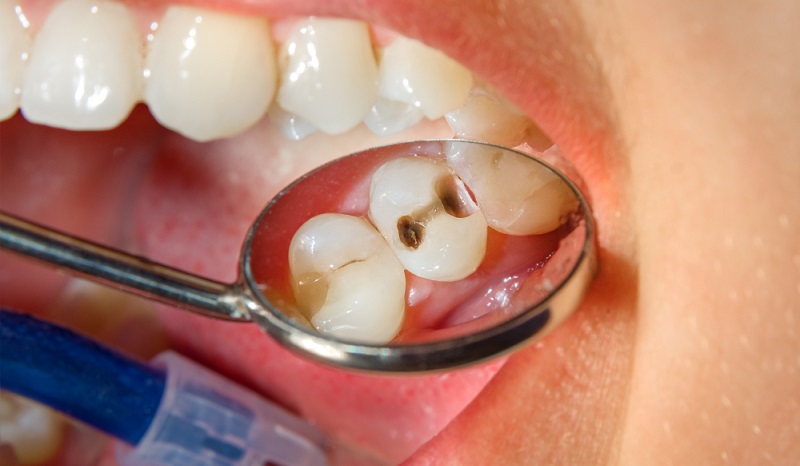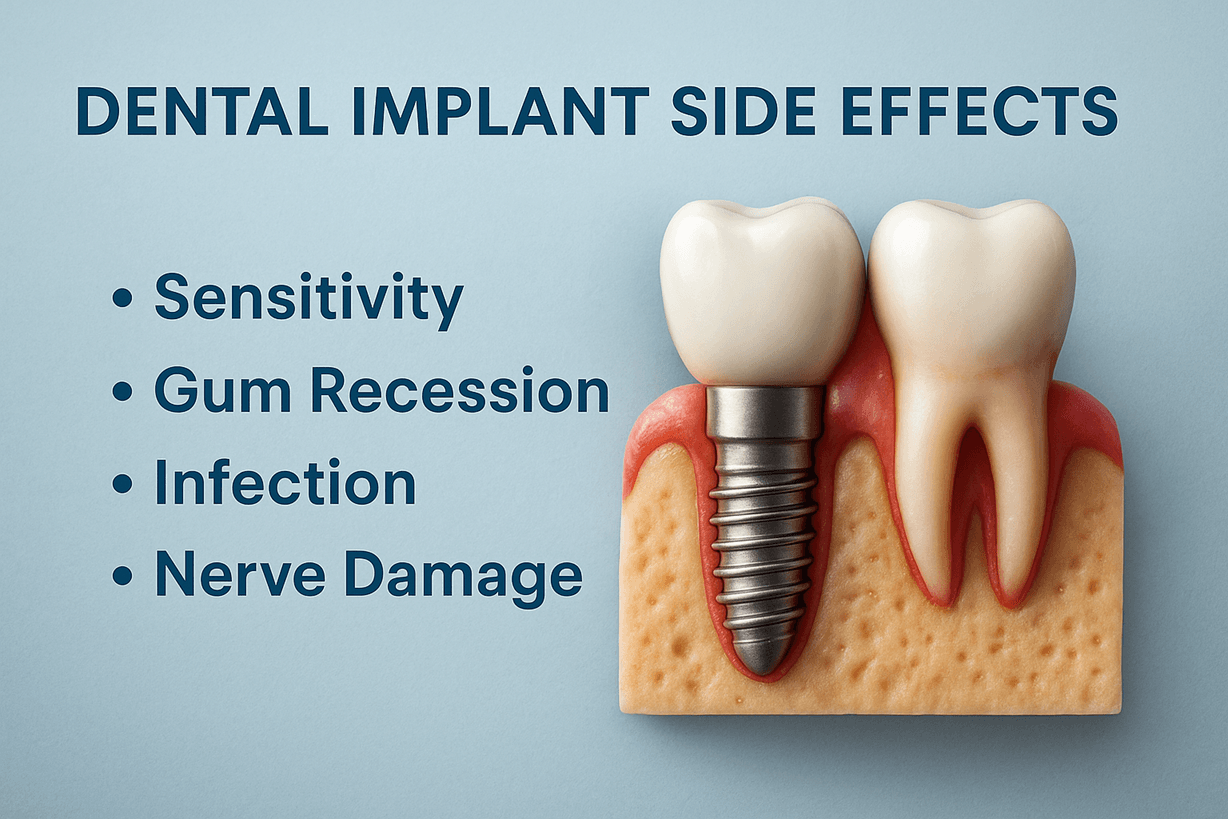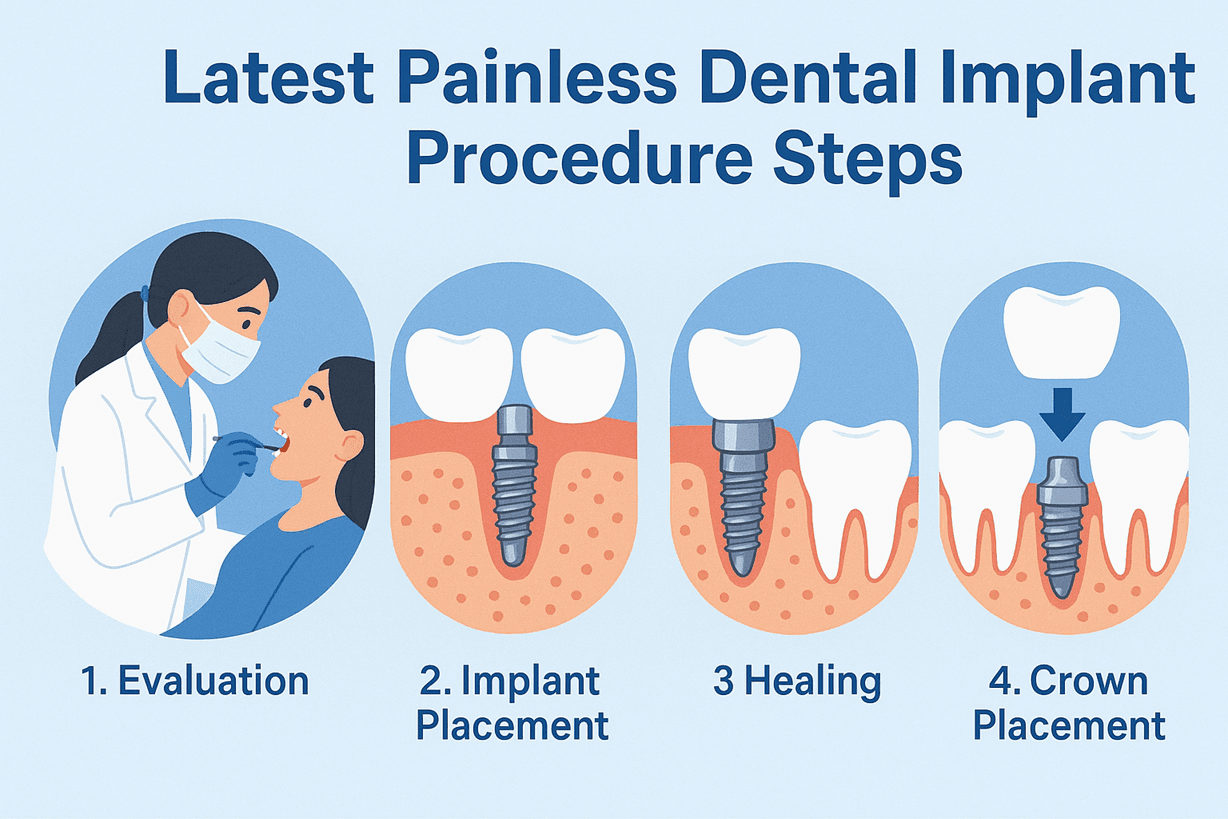Contents

Are you terrified of going to the dentist because you don't want to be told, "You have a cavity"? It's not just you. One of the most prevalent dental issues that people today have is tooth decay.
But don't panic, knowing what triggers them and how to avoid them will help you maintain strong, healthy teeth for years to come.
Everything you need to know about dental cavities will be covered in this blog post, from their causes and symptoms to available treatments and prevention advice.
What are Tooth Cavities?
One of the most prevalent chronic dental illnesses is tooth decay, sometimes referred to as dental caries. They result from plaque accumulation on teeth.
A sticky layer of food particles, bacteria, and saliva is known as plaque. When plaque is not removed, it can harden and turn into tartar. Tartar can only be removed by a dentist or dental hygienist.
Cavities form when the bacteria in plaque produce acids that eat away at the enamel on your teeth. Your teeth's tough outer layer, called enamel, guards them against deterioration.
When the enamel is compromised, the hollow will deepen until it reaches the pulp, the inner part of the tooth. Blood vessels and nerves are located in the pulp, which can get infected and cause excruciating pain.
The chewing surfaces of molars and premolars as well as the rear of teeth that touch adjacent teeth are where cavities are most frequently seen. But they can also develop on the front teeth or in the spaces between teeth.
Definition of Tooth Cavity
A tooth cavity is a hole that develops over time in your tooth. Plaque, a clingy bacterial film that develops on your teeth, is what causes cavities. Cavities are caused by the acids that plaque creates, which eat away at your tooth enamel.
Cavities can be little pits or big holes of varying sizes. Cavities can result in pain, infection, and even tooth loss if they are not corrected.
Brush your teeth twice a day with fluoride toothpaste and floss every day to prevent cavities. Visit your dentist periodically for specialized cleanings and examinations.
Symptoms of Tooth Cavity
Although tooth cavities are not necessarily painful, they can seriously harm your teeth if left untreated. A little, black spot on the tooth is the most typical sign of a cavity. The decay is brought on by the erosion of dental enamel, which opens the tooth up to bacterial invasion.
Other signs of a cavity in a tooth include:
- Sensitivity to hot or cold temperatures
- Pain when chewing
- A hole in the tooth
- Bad breath
- A foul taste in the mouth
If you suspect that you have a tooth cavity, it's important to see a dentist as soon as possible. Cavities can be treated with fillings, crowns, or other dental procedures.
Causes of Tooth Cavity
The development of tooth cavities can be influenced by a wide range of things. The anatomy of the teeth must first be understood to have a better understanding of how cavities develop.
The tooth's exterior layer is made of enamel, a hard material. Dentin, a layer that is not as hard as enamel but still offers some protection for the pulp, the interior layer of the tooth, lies beneath the enamel.
Blood vessels and nerves are located in the pulp, the part of the tooth most vulnerable to cavities.
Poor dental hygiene is one of the most common causes of cavities. Allowing plaque and tartar to accumulate on the teeth can result in an acidic environment that erodes tooth enamel and causes cavities.
The use of sugary foods and frequent snacking are other causes of cavities. These foods' sugar provides the perfect habitat for bacteria to flourish, which can result in plaque buildup and cavities.
Another condition that can cause cavities is dry mouth, which makes it easier for bacteria and plaque to build up on the teeth.
Diabetes and GERD (gastroesophageal reflux disease), for example, can make you more likely to have cavities.
Treatments for Tooth Cavity
Enamel, the tough, protective covering that covers your teeth, is destroyed by dental decay. When tooth decay penetrates the inner layers of your teeth, where it can really harm them, cavities occur.
Depending on how serious it is, there are a few different techniques to treat a cavity. Your dentist might only need to remove the decay and cover the area with a dental filling if the cavity is minor and has not yet gotten to the inner layers of your tooth.
You could require a dental crown if the cavity is more severe or has penetrated the inner layers of your tooth. Your injured tooth is covered and safeguarded with a dental crown, which is a false tooth.
If the cavity has spread to the tooth's root, you might also require root canal treatment. The diseased tissue inside your tooth is removed during the root canal procedure, and the area is then sealed to prevent additional damage.
Prevention of Tooth Cavity
Keeping your mouth healthy is the best method to avoid tooth decay. This entails using mouthwash, daily flossing, and fluoride toothpaste to clean your teeth twice a day.
Eating a balanced diet and avoiding sugary drinks and snacks are also important.
Your dentist could suggest further precautions, including fluoride treatments or sealants if you have a high risk of developing cavities.
Alternatives to Traditional Treatment
There are numerous methods for treating tooth cavities, some of which can be more successful than others.
Here are several alternatives to standard medical care:
1. Dental Sealants:
The chewing surfaces of the back teeth can be coated with dental sealants, which are transparent, thin coatings. By obstructing bacteria and food particles, they aid in the prevention of tooth decay.
2. Fluoride Treatments
These can help to reduce the risk of cavities by making the teeth more resistant to decay.
3. Tooth-colored Fillings
These are made from composite materials that match the colour of your teeth and can be used to fill in cavities.
4. Laser Therapy
This more recent alternative for treatment uses lasers to eliminate tooth decay and hasten healing.
Conclusion
It's critical to comprehend how tooth cavities are brought on and what you can do to help avoid them from forming because they can have detrimental effects on your overall health.
You can reduce your risk of developing tooth cavities by visiting your dentist regularly for checkups, brushing and flossing twice daily with the proper technique, cutting back on your sugar intake, avoiding acidic foods and beverages, limiting your snacking between meals, and drinking fluoridated water.
You should be able to maintain the health of your teeth both now and in the future by adhering to these recommendations.
Frequently Asked Questions
1. What is a cavity?
A cavity is a hole in a tooth caused by tooth decay. It is also known as dental caries or a tooth cavity.
2. What causes cavities?
When bacteria in the mouth break down sugar and other carbs, they release acid, which is what causes cavities.
As a result of this acid attacking the tooth enamel, a cavity will eventually develop and cause decay.
3. How are cavities formed?
Cavities develop when acid produced by oral bacteria weakens the enamel on the tooth's surface. Acid gradually dissolves the enamel, creating a hole or cavity in the tooth.
4. What do cavities look like?
On the surface of a tooth, cavities might look like black spots or holes. They could also make the impacted tooth sensitive or hurt.
5. What is the oral cavity?
The mouth, including the lips, tongue, teeth, gums, and the roof and floor of the mouth, is referred to as the oral cavity. It serves as the starting point for the respiratory and digestive systems.
6. Does tooth cavity spread?
Yes, a dental cavity can expand to other areas of the tooth and the tissues around it if it is not treated, which could lead to infection and further harm.
7. Is tooth decay reversible?
With the right dental treatment and oral hygiene practices, tooth decay may be reversed in its early stages. However, once a cavity has developed, it cannot be treated and must be removed by dental work.
8. Can tooth cavities cause cancer?
There is no proof to support the idea that a tooth cavity might lead to cancer. However, neglecting oral hygiene and leaving cavities untreated can raise your risk of developing gum disease, which has been linked to a few cancer types.
9. How to stop a cavity from spreading?
By brushing, flossing, and scheduling routine dental checkups and cleanings, one can prevent cavities from getting worse by maintaining proper oral hygiene. A filling, crown, or root canal therapy are all possible options for treating the cavity.
10. How to treat cavities?
The severity of the decay affects how cavities are treated. The decayed part of the tooth is often removed by a dentist, who then uses a dental filling to seal the cavity.
To save the tooth in more serious situations, a crown or root canal procedure may be required. To avoid further harm and probable tooth loss, it is crucial to seek dental treatment as soon as you can.


